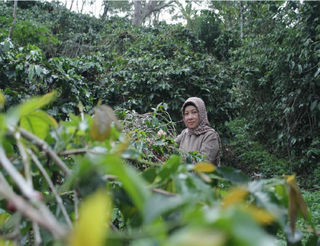October 2021
Feature #36
Rounding out our third year of telling stories over a cuppa is Prima Roastery from Woolston, Christchurch.
Its been about 18 months since we first staretd working together, with our first collaboration coming out diring the inagural lockdown. As luck would have it, we found ourselves putting together another collaboration with the Prima team during lockdown 2.0.
When it comes to memorable collaborations, its 2 from 2 with Prima. Last time we revisited a producer for a second time, featuring a differet coffee. This time its all new, from the country to the variety and speaking of firsts, lets get into the story of Kokowagayo.
THE COOPERATIVE:
Founded in 2014, Kokowagayo is the first women only cooperative in Asia. Inspired by a lack of ability to participate in existing cooperatives, out of respect and loyalty to their husbands, fathers and other male figures, Mrs Rizkani and 470 other members of the Permata Gayo Cooperative formed the Kokowagayo (Gayo Womens Cooperative Coffee). Founded with the full support of their husbands, Kokowagayo has achieved equality in providing women with training in many facets of coffee production from cultivation to processing, roasting and management. Not only has the cooperative improved livelihood for producers, since mid 2016 Kokowagayo have been distributing the premium received for their fair trade and organic coffee. This premium, totaling 230,000 USD has seen enabled the construction of a coffee processing station and offering financial support to the construction of a child care and health centre which focuses on the health of children and the reproductive health of women. Representing women from 8 villages, the cooperative now boasts 551 members, all female. Kokowagayo is also one of the few traceable cooperatives in Sumatra to hold Ecocert organic and fair trade certifications. Processing is done by Kokowagayo’s 8 collectors (one based in each village). Collectors are member farmers who have the ability process parchment. Collectors handle the process of depulping, fermenting and drying to 20% moisture where it is packaged and labeled according to the village it has come from, before being delivered to the cooperatives Dry mill, where it is further dried to 12-13% moisture before being cupped and blended based on cup profile.
SUMATRA:
Dutch Colonials introduced coffee onto the Indonesian islands of Java and Sumatra around 1699 marked by the planting of Typica, with coffee production beginning in the late 1800’s and was commonly sold as Mandheling, which was in fact the name of a Sumatran tribe, not anything specific to the coffee. The term Mandheling is now used to refer to coffee grown in the Aceh / Gayo region of Sumatra, located in the north, one of Sumatra's 3 coffee growing regions. As approx 90% of coffee in Sumatra is produced by small lot holders (averaging 2.5 hectares) cooperatives play an important part in coffee processing for local producers. The wet hulling process or Giling Basah as it is known locally is the traditional processing method of coffee in Sumatra. As with traditional processing methods of most origins, it owes to the influence of climatic conditions as the wet climate of Sumatra makes drying of coffee a challenge. Wet hulling allows coffee to retain moisture longer, drying slower. Historically, Sumatran coffee is known for its full body and low acidity and earthy tones, however when processed using dry hulling (natural) or washed processed, their flavour profile offers more acidity.
GAYO VARIETIES:
Typical of many coffee producing countries, Sumatra, (Indonesia) has undertaken the development of its own unique varieties through necessity. Development began in 1979 and continued into the 80’s as part of the PRPTE (Project of Rejuvenation and Expansion of Export Crops). The programme like many of its kind in coffee research facilities across the growing nations, utilised Hybrido de Timor (TimTim as its known in Indonesia, an Arabusta from Timor Leste) as a basis for its breeding programme. The result was Gayo, a family of many varieties and cultivars developed n in Indonesia. Within the Gayo family there are two notable and mass cultivated lines, Gayo 1 and Gayo 2. Gayo 1 is the result of a little documented selection error by staff involved in the programme, resulting in a variety that offers little variation, and is considered part of the Arabusta Family. Gayo 2, identified as part of the Bourbon family, is the result of multiple selections derived from 4 coffee plants planted in a farmers garden in Jong Meluem Village, Bandar District. The development of Gayo and introduction of Timtim would prove to be an important event and in more recent times such varieties have become widely cultivated as a result of more traditional varieties such as Catimor Juluk and S-Lini (also featured in this lot) becoming susceptible to coffee leaf rust and root disease.
TASTING NOTES:
Country: Indonesia
Regiont: Gayo Mountain, Bener Meriah, Nanggroe Aceh Darussalam, Sumatra
Cooperative: Kokowagayo
Founded: 2014
Altitude: 1200 - 1800 M.A.S.L
Varietal/Species: Catimor Jaluk, Gayo 1 (Arabusta TimTim) Gayo 2 (Bourbon), S.lini, P88
Process: Semi-Washed (wet-hulled / Honey) Sun Dried
Certifications: Fairtrade, Organic
Tasting notes: Cocoa, Tobacco, Earthy, Sweet Smooth, Balanced

|
© Copyright A Bunch of Snobs |


